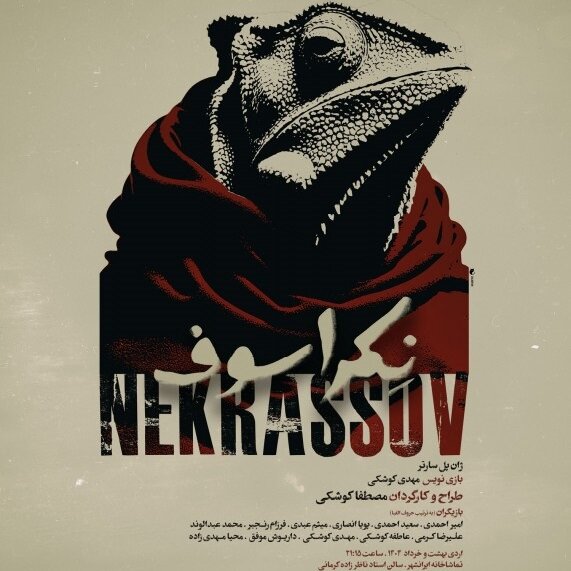Tehran – The satirical play “Nekrasov” by Jean Paul Sartre is set in Tehran’s Iranshire Theatre complex.
Mostafa Kushki oversaw the 80-minute play. The cast includes Amir Ahmadi, Saeed Ahmadi, Puya Ansari, Maysam Abdi, Fazam Ranjivar, Mohammad Abdulband, Alileza Karami, Atefekshiki, Medi Kushki, Darish Mowafag and Mahiya Medizadeh.
Written in 1955, “Nekrasov” is a farce with eight scenes. It will be held in Paris in the 1950s. French right-wing newspaper SoirA shows the life of Cibillot, an unfortunate journalist who works in Paris. His job is primarily to write anti-communist propaganda. When he can’t come up with a great idea, his boss, Jules Parochin, tells him that if he doesn’t find the news, he’ll be fired.
However, during his depression, Luck comes to the house of the man of Georges des Varera, an internationally desired con man. De Varera’s main talent is to use his words to manipulate almost everyone around him for his own interests. De Varera tells Cibillot that he has a story that can save a journalist’s career, but only if Cibillot refuses to give him to the police. You can then see how Georges des Valera becomes Nikita Nekrasov, the escaped Soviet minister, and how he made his life a level of a French national hero.
In Nekrasov, readers can observe some of the problems that exist in Jean-Paul Sartre’s philosophy. The question of identity as Georges fights against yourself to determine which identity is stronger (Necrasov or Georges) is one of the key factors. However, hierarchical force and structure issues also appear in the Soir A Paris hierarchy.
We do a lot at work, such as human stupidity, the way we try to manipulate and own other people, and how it affects our moral lives.
Jean Paul Sartre (1905-1980) was a French philosopher, playwright, novelist, screenwriter, political activist, biographer and literary critic, and was considered a leading figure in French philosophy and Marxism in the 20th century.
Sartre was one of the key figures in existentialist philosophy (and phenomenology). His works have influenced sociology, critical theory, colonial theory, and literary studies.
He won the 1964 Nobel Prize in Literature despite attempting to reject it.
Sartre wrote successfully in many literary modes and made great contributions to literary criticism and literary biography. His plays are richly symbolic and serve as a means of conveying his philosophy.
Despite the similarities with controversies, novelists, adaptors and playwrights, Sartre’s literary works are often counteracting Camus’s in the popular imagination.
“Nekrasov” will remain on stage at the Iranshaal Theatre in the Artist Park on North Moosabi Street on Talekani Street until June 20th.
SS/SAB

